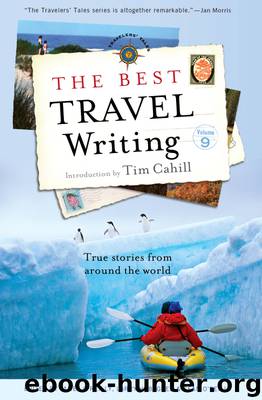The Best Travel Writing by James O'Reilly

Author:James O'Reilly [O’Reilly, James, Habegger, Larry and Sean O’Reilly]
Language: eng
Format: epub
Tags: TRV010000
ISBN: 978-160952-058-8
Publisher: Travelers' Tales
Published: 2012-09-11T04:00:00+00:00
Mary Wollstonecraft was a warrior from birth, and never let up. A good hater, her husband, William Godwin, described her. She grew up witness to what she would describe as the “tyranny” of a bad marriage: her abusive father farmed halfheartedly, gambled, and drank. Young Mary Wollstonecraft slept on the landing outside her mother’s bedroom to protect her from him, and once her mother died, she lit out to cobble together an independent existence. “It is a happy thing to be a mere blank,” she wrote, “and to be able to pursue one’s own whims, where they lead, without having a husband and half a hundred children to teaze and controul a poor woman who wishes to be free.” The patriarchy of society, she saw early on, was just the patriarchy of the family writ large—one big bad marriage in which everyone was trapped.
London, of course, was her destination: the eighteenth-century version of the “creative class” centered around her publisher, Joseph Johnson, in St. Paul’s Churchyard. She plunged into a self-fashioned intellectual life, arguing with men around dinner tables, including Godwin, who didn’t like her the first time they met. Eventually she wrote the pair of political treatises that made her name, Vindication of the Rights of Man (1790) and Vindication of the Rights of Woman (1792). The latter, in particular, made her notorious, although its central theme now seems too obvious to state: the mind is not gendered—or limited—by the gender of the body in which it resides, which is bound by a society organized from top to bottom to benefit men. Therefore, social and educational institutions must be reformed to let women live up to their full potential. “[T]he most perfect education, in my opinion,” she wrote, “is such an exercise of the understanding as is best calculated to strengthen the body and form the heart. Or, in other words, to enable the individual to attain such habits of virtue as will render it independent. In fact, it is a farce to call any being virtuous whose virtues do not result from the exercise of its own reason.”
Drawn by the bloody drama of the French Revolution—like any journalist drawn to Afghanistan today—Wollstonecraft went to Paris intending to write her own history of it. There she met Gilbert Imlay—a tall, charming venture capitalist and professional trader in sentiment, including Europeans’ yearning for an unspoiled New World and Wollstonecraft’s for a man who understood her. But his mode of love, unlike hers, was to enjoy himself and then move on. Wollstonecraft fell in love anyway, meeting him during the height of the Terror at the barricades of the city and conceiving her first child, Fanny. She dreamed of traveling back to America with him, of starting a new life on a farm in the former colonies—sturdy and self-sufficient as Dicey Langston. Yet the relationship foundered, then soured. But still, on his behalf, Wollstonecraft traveled.
Go to Scandinavia and find out what happened to my ship, Imlay asked. I trust you. The ship was full of silver to rescue him from debt, and it had disappeared.
Download
This site does not store any files on its server. We only index and link to content provided by other sites. Please contact the content providers to delete copyright contents if any and email us, we'll remove relevant links or contents immediately.
Asking the Right Questions: A Guide to Critical Thinking by M. Neil Browne & Stuart M. Keeley(5775)
Autoboyography by Christina Lauren(5235)
Eat That Frog! by Brian Tracy(4542)
Dialogue by Robert McKee(4405)
Sticky Fingers by Joe Hagan(4201)
Journeys Out of the Body by Robert Monroe(3625)
Annapurna by Maurice Herzog(3470)
Full Circle by Michael Palin(3450)
Schaum's Quick Guide to Writing Great Short Stories by Margaret Lucke(3381)
Elements of Style 2017 by Richard De A'Morelli(3350)
The Art of Dramatic Writing: Its Basis in the Creative Interpretation of Human Motives by Egri Lajos(3068)
Atlas Obscura by Joshua Foer(2963)
Why I Write by George Orwell(2955)
The Fight by Norman Mailer(2943)
The Diviners by Libba Bray(2939)
In Patagonia by Bruce Chatwin(2932)
The Mental Game of Writing: How to Overcome Obstacles, Stay Creative and Productive, and Free Your Mind for Success by James Scott Bell(2909)
Venice by Jan Morris(2575)
The Elements of Style by William Strunk and E. B. White(2475)
